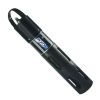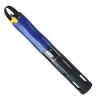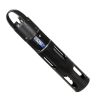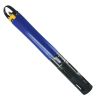YSI EXO Wiped Conductivity & Temperature Sensor
Features
- Allows for cleaning of entire conductivity cell
- Save time and money by reducing site visits
- 0 to 100 mS/cm measurement range
- Free ground shipping
- Expedited repair and warranty service
- Lifetime technical support
- More
Overview
The YSI EXO wiped conductivity & temperature sensor is designed for the EXO2 and EXO3 sondes with central wiper to reduce cleaning requirements in unattended deployments.
Cost and Time Efficient
- Save money by reducing the number of site visits each year
- Lower the cleaning & maintenance requirements for conductivity sensors
- Spend less time with anti-fouling screens and removing the build-up of hard growth
- Reduce the need for post-processing data and manually adjusting for fouling-related sensor drift
Reliable
- Improve reliability with non-metallic electrodes
- Avoid stagnant readings and reduce the impact of micro-environments
- Prevent particulates, algae, barnacles, and trapped gasses from impacting data
- (1) EXO wiped conductivity & temperature sensor
- (1) Central wiper brush kit
- (1) EXO sensor brace kit
In The News
From the Tap: Source Water Monitoring for Public Health
In regions with historically secure access to clean drinking water, few think about the work that goes into ensuring that the water they fill their cups with is safe. In reality, millions of dollars are invested in the infrastructure, equipment and teams involved in converting source water into drinking water. While all the work that goes into providing clean water often goes unnoticed, analysts like Michele Gilkerson, a water research analyst with the City of Columbus Division of Water, know exactly how much goes into securing safe water for millions of people. Gilkerson started with Battelle Memorial Institute in 1991 in their water ecology section. There, she saw how interesting source water monitoring could be, even though it isn’t often spotlighted in the environmental sector.
Read MoreYSI EXO3s: The Latest in Water Quality Monitoring
The YSI EXO3s offers the latest in multi-parameter water quality monitoring equipment that has a comprehensive list of smart sensors. With an external power source, this sonde is a cost-effective, compact EXO that has the same capabilities as the EXO3 . The sonde is built to last with resilient materials and backed with vigorous testing. The device has five ports for available YSI EXO smart sensors or central wiper. It seamlessly integrates with a data logger to collect and push valuable data to the cloud for access from a PC or mobile device. This small sonde is exceptional for both sampling and continuous monitoring applications.
Read MoreSupplying Seattle’s Drinking Water: Using Data Buoys to Monitor the Cedar River Municipal Watershed
Providing clean, safe, and reliable drinking water for the 1.6 million people in the greater Seattle area is a top priority for Seattle Public Utilities (SPU). With limited water supplies, SPU dedicates considerable resources to maintain its watersheds and mountain reservoirs. About 70 percent of Seattle Water comes from the Cedar River Municipal Watershed , and the other 30 percent comes from the South Fork Tolt River Watershed . [caption id="attachment_39574" align="alignnone" width="940"] Data buoy in Chester Morse Lake . (Credit: Kevin Johnson / Seattle Public Utilities) [/caption] Jamie Thompson, a fisheries biologist at SPU, monitors aquatic ecosystems centered on fish listed under the U.S. Endangered Species Act (ESA).
Read More


















